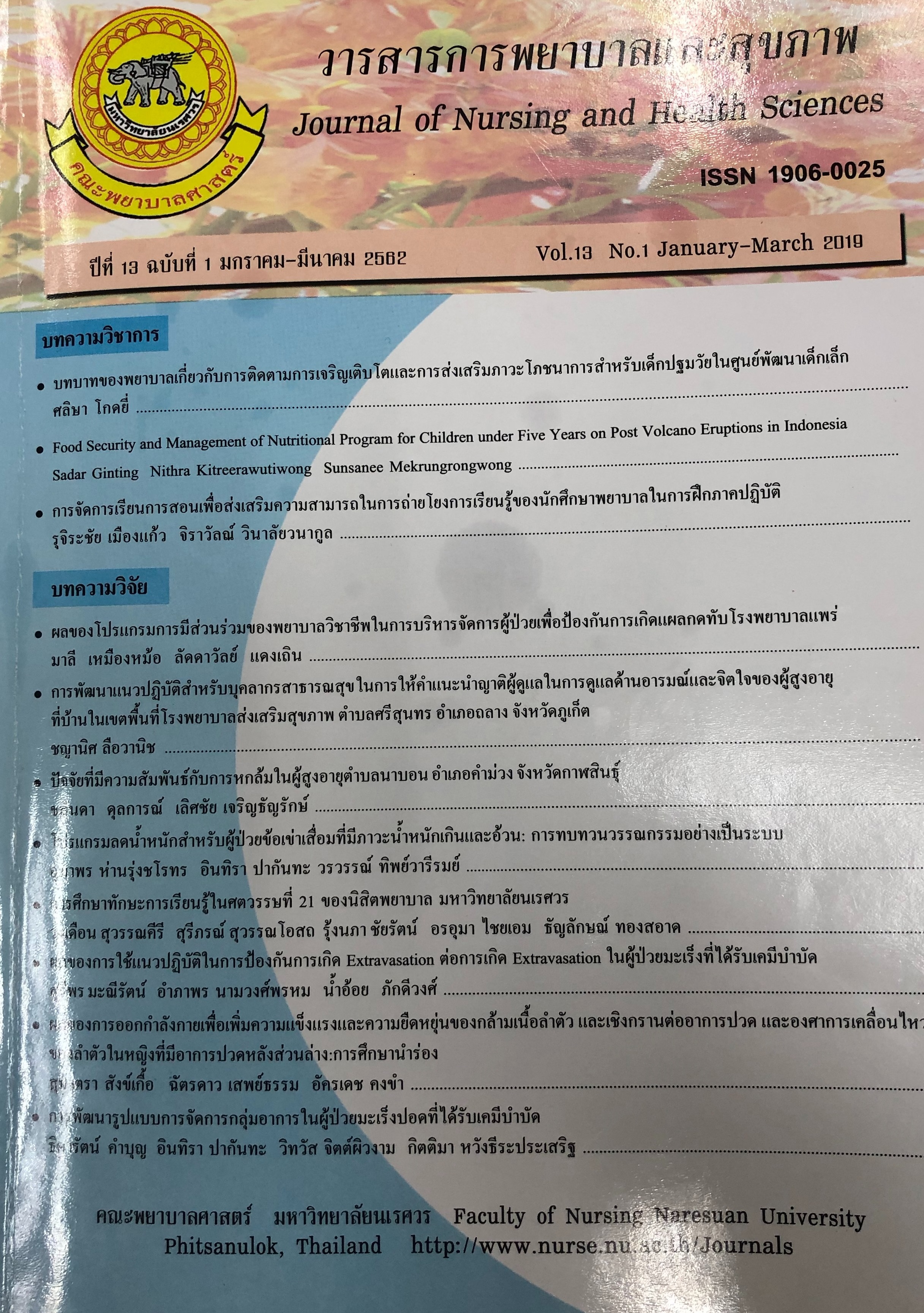บทบาทของพยาบาลเกี่ยวกับการติดตามการเจริญเติบโตและการส่งเสริม ภาวะโภชนาการสำหรับเด็กปฐมวัยในศูนย์พัฒนาเด็กเล็ก
Main Article Content
บทคัดย่อ
การติดตามการเจริญเติบโตและส่งเสริมภาวะโภชนาการสำหรับเด็กปฐมวัยมีความสำคัญ หากไม่ได้ รับการดูแลอย่างเหมาะสมจะทำให้เด็กเกิดภาวะทุพโภชนาการทั้งขาดสารอาหารและน้ำหนักเกินหรืออ้วน ซึ่งอาจส่งผลต่อภาวะสุขภาพของเด็ก เช่น ระดับเชาว์ปัญญาต่ำกว่ามาตรฐานและการเกิดโรคติดต่อไม่เรื้อรัง ในวัยผู้ใหญ่หรือผู้สูงอายุ พยาบาลเป็นบุคคลหนึ่งที่มีบทบาทสำคัญในการติดตามการเจริญเติบโตและการ ส่งเสริมภาวะโภชนาการเด็ก บทบาทของพยาบาลประกอบด้วย การประเมินและติดตามการเจริญเติบโตอย่าง สม่ำเสมอเพื่อเฝ้าระวังภาวะทุพโภชนาการในเด็กปฐมวัย การนำความรู้จากงานวิจัยมาประยุกต์ใช้ในการจัด กิจกรรมส่งเสริมโภชนาการแก่ครู เด็กและผู้ปกครอง การร่วมกับแม่ครัวของศูนย์พัฒนาเด็กเล็กและโภชนากร ในการวางแผนเมนูอาหารกลางวันที่เหมาะสม และการรวบรวมข้อมูลทางโภชนาการของเด็กปฐมวัยอย่างเป็น ระบบสำหรับนำเสนอต่อผู้ที่มีส่วนเกี่ยวข้อง การปฏิบัติบทบาทของพยาบาลดังกล่าวเป็นไปตามทฤษฎีเครือข่าย ทางสังคม/แรงสนับสนุนทางสังคม โดยเป็นผู้ที่มีบทบาทหน้าที่และมีปฏิสัมพันธ์กับเด็กและครอบครัว รวมทั้ง เป็นผู้ที่สามารถสร้างแรงสนับสนุนทางสังคมแก่เด็กและครอบครัวได้ทั้งในด้านอารมณ์ วัตถุสิ่งของและ ด้านข้อมูลแก่ผู้มีส่วนเกี่ยวข้องในการส่งเสริมภาวะโภชนาการเด็กปฐมวัย ซึ่งเชื่อว่าจะสามารถป้องกันและแก้ไข ปัญหาภาวะทุพโภชนาการในเด็กปฐมวัยและขับเคลื่อนการส่งเสริมภาวะโภชนาการเด็กปฐมวัยให้บรรลุเป้าหมาย ตามแผนยุทธศาสตร์กระทรวงสาธารณสุขได้อย่างมีประสิทธิภาพ
Article Details
เอกสารอ้างอิง
Bureau of Nutrition, Department of Health, Ministry of
Public Health. (2015). Guide to the
implementation of health promotion nutrition in
good health clinic for health personnel. Retrieved
April 2018 from http://nutrition.anamai.moph.go.th/
images/file/ค่มู ือส่งเสริมสุขภาพด้าน
โภชนาการ_ในคลินิก สุขภาพเด็กดี.pdf [In Thai].
Bureau of Nutrition, Department of Health, Ministry of
Public Health. (2017). District development
guidelines for children 0-5 years old asymmetry,
teeth do not decay, development is good, 2017. Retrieved
April 2018 from http://nutrition. anamai.
moph.go.th/images/file/ค่มู ือแนวทาง พัฒนาต าบล
สางเสริมเด็ก%200-5%20ปี.pdf [In Thai].
Katekowit, B., & Tungsriprai, S. (2017). Food
consumption behaviors of preschool children
in the area of regional health center 4 Saraburi.
Department of Medical Services Journal, 42(6),
-134. [In Thai].
Khungtumneam, K. (2016). Community health care
process: The role of community nurse. Journal of
Phrapokklao Nursing College, 27(2). 140-148.[In
Thai].
Klunklin, P. (2011). Theories related to child development.
In N. Thaiyapirom (Ed.), Child health promotion
book 1 (pp. 110-131). Chiang Mai: Krongchangprinting.
[In Thai].
Klunklin, P. (2012). Health promotion for preschool
children. In P. Klunklin, (Ed.), Health promotion
for children of all ages (pp. 71-122). Khon Kaen:
Klungnana vitthaya press. [In Thai].
Kongton, T., & Banchonhattakit, P. (2013). Effectiveness
of promoting vegetable and fruit consumption
behavior program among pre-school children by
parents at child development center, Muang
District, Surin Province. The Public Health Journal
of Burapha University, 8(1), 26-36. [In Thai].
Kunpeuk, W., Cetthakrikul, N., Phukerd, S., Pongcharoen,
T., Udomkarnjananan, S., Pongguttha, S., …
Thamarangsi, T. (2015). Situation of food
provision in child care centers in thailand.
Journal of Health Science, 24(4), 621-635. [In
Thai].
Kwannate, C., Chaimonkol, N., Pongjaturawit, Y., &
Loman, D. (2016). The effectiveness of a parent
– focused intervention on eating behavior and
patterns and BMI among Thai preschool children.
Journal of The Royal Thai Army Nurses, 17(3),
-33. [In Thai].
Mohamed Diab, S. S. E. (2015). Effects of nutritional
guideline for kindergarten teachers on healthy
physical growth of preschool children. IOSR
Journal of Research & Method in Education,
(4), 17-25.
National Electronics and Computer Technology Center.
(2016). KidDiary. Retrieved 1 July 2018 from
https://www.nectec.or.th/innovation/innovationmobile-
application/kid-diary.html)
National Statistical Office. (2016). Child and woman
situation survey project in Thailand 2015-2016.
Retrieved 20 April 2018 from https://
www.m-society.go.th/article_attach/
/20281.pdf [In Thai].
Singhasame, P., Suwanwaha, S., & Sarakshetrin, A.
(2017). Nutritional promotion in pre-school
children. The Southern College Network Journal
of Nursing and Public Health, 4(3), 226-235.
[In Thai].
Strategy and Planning Division, Ministry of Public Health.
(2017). Strategic plan for the Ministry of Public
Health 2018-2021. Retrieved 20 April 2018
from http://203.157.229.33/archives/
downloadpage/file/p04.pdf [In Thai].
Tansakul, S. (2007). Behavioral theory: guidelines for
health education and health promotion. Journal
of Health Education, 30(105), 1-15. [In Thai].
World Health Organization. (2016). Global Health
Observatory (GHO) data. Retrieved 20 April
from http://www.who.int/gho/childmalnutrition/
en/


